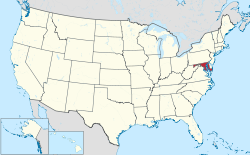 | |
| Number of elections | 59 |
|---|---|
| Voted Democratic | 27 |
| Voted Republican | 14 |
| Voted Whig | 5 |
| Voted Democratic-Republican | 8 |
| Voted Federalist | 1 |
| Voted other | 4 [a] |
| Voted for winning candidate | 43 |
| Voted for losing candidate | 16 |
Following is a table of United States presidential elections in Maryland, ordered by year. Since its admission to statehood in 1788, Maryland has participated in every U.S. presidential election. Considered a bellwether state during the 20th century, only voting for the losing candidate three times during that century, Maryland has since become one of the most blue (Democratic) states, last voting for a Republican candidate in 1988.
Contents
- Elections from 1864 to present
- Election of 1860
- Elections from 1828 to 1856
- Election of 1824
- Elections from 1788-1789 to 1820
- See also
- Notes
- References
Winners of the state are in bold. The shading refers to the state winner, and not the national winner.